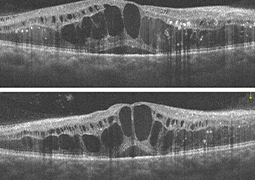Aims: To investigate the efficacy and safety of intravitreal Dexamethasone implant (DEX-I) therapy in the treatment of diabetic macular edema (DME) refractory to intravitreal bevacizumab (IVB).
Material and methods: This retrospective and cross-sectional study included 37 eyes of 37 patients who received 3 loading doses of IVB injections for DME with no response and underwent DEX-I implant. Best-corrected visual acuity (BCVA), intraocular pressure (IOP) measurements and central foveal thickness (CFT) measured by spectral domain optical coherence tomography (SD-OCT) were recorded and compared before DEX-I, at the first week, first, second, third and sixth months. Duration of DME, glycated hemoglobin (HbA1c) levels, DME types and lens status (phakic, pseudophakic) were also recorded.
Results: The mean age of the patients was 61.14 ±8.69 years (59.5% male, 40.5% female). 35.1% of the patients had cystoid macular edema, 64.9% had diffuse macular edema and 73 % were phakic and 27% were pseudophakic. BCVA, CFT and IOP values before DEX-I injection were 0.78 ±0.16 LogMAR, 493.73 ±107.6 µm and 13.05 ±2.59 mmHg, respectively. At 6 months after DEX-I, BCVA, CFT and IOP values were 0.64 ±0.11 LogMAR, 397.35 ±59.72 µm and 16.3 ±2.51 mmHg, respectively. In all follow-ups, there was a significant improvement in BCVA, a significant decrease in CFT and a significant increase in IOP compared to pre-injection. Ocular hypertension was observed in 0.8 % of patients and progression of cataract progression in 1% of patients after treatment.
Conclusion: DEX-I therapy is an effective and safe treatment option for DME refractory to IVB treatment.

